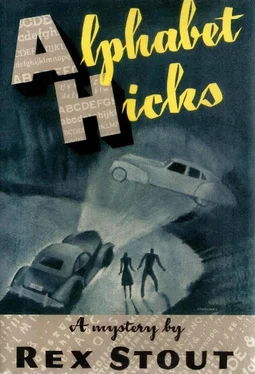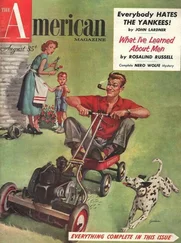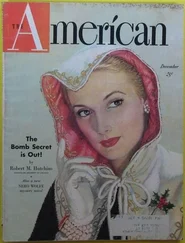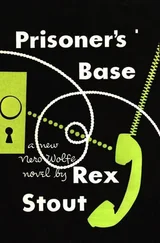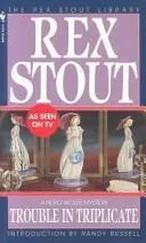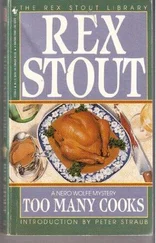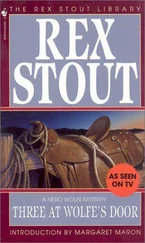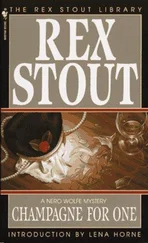In yellow pajamas piped in brown, he sat on the edge of the bed and opened the box of chocolates and smelled it with a long deep inhalation.
“I’ll earn it and then I’ll eat it,” he muttered. If he had known how much of a chore the earning was to be, he might have added, “If I’m still alive.”
In the reception room of the executive offices of the Republic Products Corporation high above Lexington Avenue, the receptionist sat at her desk and tried not to yawn. Losing the struggle, she covered her mouth with a palm. It was five minutes past nine, Thursday morning. Life presented a dreary outlook. Her feet hurt. Dancing till after one o’clock, and less than six hours’ sleep, and standing up in the subway... no more, she just couldn’t take it, not at her age... that was all right when she was younger, but now she was twenty-three, nearly twenty-four—
“Good morning,” said a twangy voice.
The voice irritated her. Her tired eyes saw a man in a new-looking brown suit, and a face that was new to her, with a large envelope under his arm.
“Who do you want to see?” she asked. Ordinarily she said “Whom,” but, feeling as she did, that was beyond her.
“You,” the man said.
That old gag deserved, and usually received, chilly disdain. But the idea that anyone on earth could want to see her then, the way her face felt and the way her feet hurt, was so perfectly excruciating that she had to laugh. She burst into laughter.
“No,” the man protested. “Really. I want to ask if you’d like to take a trip to Hollywood.”
“Sure,” she said scornfully. “Does Garbo need a double or what?”
“You’ll never get anywhere,” said the man severely, “with an attitude like that. Here’s opportunity knocking at your door and listen to you.” He placed the envelope on the desk, opened the flap, extracted a large glossy photograph, and held it in front of her. “Who is that?”
With one glance she said sarcastically, “John Barrymore.”
“Very well,” he said reproachfully. “You’ll live to regret it. There’s four more pictures of movie stars in here. If you can identify all five, you get a year’s subscription to the Movie Gazette. Free. Then you write an article of a thousand words and send it to our contest editor—”
“I don’t know any thousand words.” She glanced at the photograph again. “But if they’re all as easy as that. Shirley Temple.”
“Right.” He pulled out another one. “Now watch your step.”
She snorted. “Those eyes? Bette Davis.”
“Two right. This one?”
“Deanna Durbin.”
“And this?”
“Myrna Loy.”
“Good for you. Four down and one to go. This last one?”
She squinted at it. She took it from him and peered at it from different angles. “Huh,” she said, “I thought there was a catch in it. This is probably some dame that sat on a wagon in ‘Gone With the Wind’ when they fled from that town in Virginia, I think it was—”
“Atlanta, Georgia. But you wrong me. I think you ought to recognize her without straining your brain beyond its capacity. Dressed differently, of course. For instance, imagine her getting out of the elevator and walking up to you here at your desk — with a hat on, remember, and some kind of a wrap probably, and sort of nervous, and saying for instance that she wanted to see Mr. Vail—”
The girl hissed at him.
He followed her glance and saw a man approaching — a large man, well fed and well shaved, with a broad nose and a thin mouth. He had been headed from the elevator for the corridor leading within, but swerved and was approaching...
“Good morning, Mr. Vail,” the girl said as brightly as though her feet were perfectly all right.
His “Good morning” sounded more like Bulgarian. “What’s all this?” he demanded, stopping at the desk. He frowned at the photographs, at the stranger standing there. “I heard you mention my name—”
“Just accidentally, Mr. Vail,” the girl said hastily. “He was only telling me — only showing me—”
She stopped because something queer was happening. Vail had glanced at the photograph she had put down, the unidentified one, had bent over to look at it, and then had abruptly straightened up; and the expression on his face frightened her, though it was directed not at her but at the stranger. Though she had seen him angry before, she had never seen his lips as thin as that, nor his eyes drawn so narrow.
“Ah,” he said. Then suddenly he smiled, but it was not a smile to reassure anybody, least of all the man it was aimed at. “There is some explanation of this, I suppose? This picture of a lady — an old friend of mine?”
The stranger smiled back. “I can make one up.”
Vail took a step. “Who are you?”
The other took a wallet from his pocket, fished out a card, and offered it. Vail took it and looked at it:
A. HICKS
M.S.O.T.P.B.O.M.
He looked up, unsmiling. “This... this hash?”
The other gestured it away. “Unimportant. One of my titles. Melancholy Spectator of the Psychic Bellyache of Mankind. The name is Hicks.”
“Who sent you here?”
Hicks shook his head. “I didn’t come to see you, Mr. Vail. Some other time, maybe.” He reached for envelope and photographs.
“Leave those things here and get out!”
But Hicks gathered them up with one swoop of his hand and made for the elevator. In a moment a down car stopped for him.
As he emerged from the building no sign of the smile was on his face. He was beginning to suspect that he was in for something nasty. It seemed likely, considering how startlingly Vail’s narrowed eyes had been those of a wary and malevolent pig, that some one was going to-get hurt.
He sat on a bench in Bryant Park and thought it over.
The office of R. I. Dundee and Company was on 40th Street near Madison Avenue, a mere five-minute walk from that of its hottest competitor, Republic Products Corporation.
At eleven o’clock that Thursday morning, anyone seeing R. I. Dundee seated at his desk would not have guessed that only ten minutes ago a phone call from the Chicago branch had brought the glad tidings that a $68,000 contract for plastics had just been closed with Fosters, the biggest manufacturers of loose-leaf binders in the country. Dundee sat staring at a corner of the rug with an expression of mingled dejection and choler. With his regular precise features and his well-fitting conservative gray coat, he looked like a man intended by both nature and himself to be neat and personable, but with his disarranged hair and his bloodshot eyes, the intention was shockingly impugned.
He shifted in his chair and groaned, and when there was a knock at the door he yelled in a tone of extreme exasperation, “Come in!”
A boy entered and handed him a card:
A. HICKS
C.F.M.O.B.
Beneath was written in ink, “Have just seen Mr. James Vail. It might interest you.”
Dundee straightened up and gave the card another look. He rubbed it with his thumb and forefinger, and looked at it again.
“What does this man look like?”
“He looks all right, sir. Except his eyes maybe. They’re kind of gleamy and menacing.”
“Send him in here.”
The boy went. When, a moment later, the visitor entered, he got a cool reception. Dundee stayed in his chair, offered no greeting, and stared up at the newcomer. Hicks stood on the other side of the desk and returned the stare, then circled around to a chair, sat, and said:
“Candidate for Mayor of Babylon. Not Babylon, Long Island. Babylon.”
Dundee blinked with irritation. “What the devil are you talking about?”
Читать дальше
